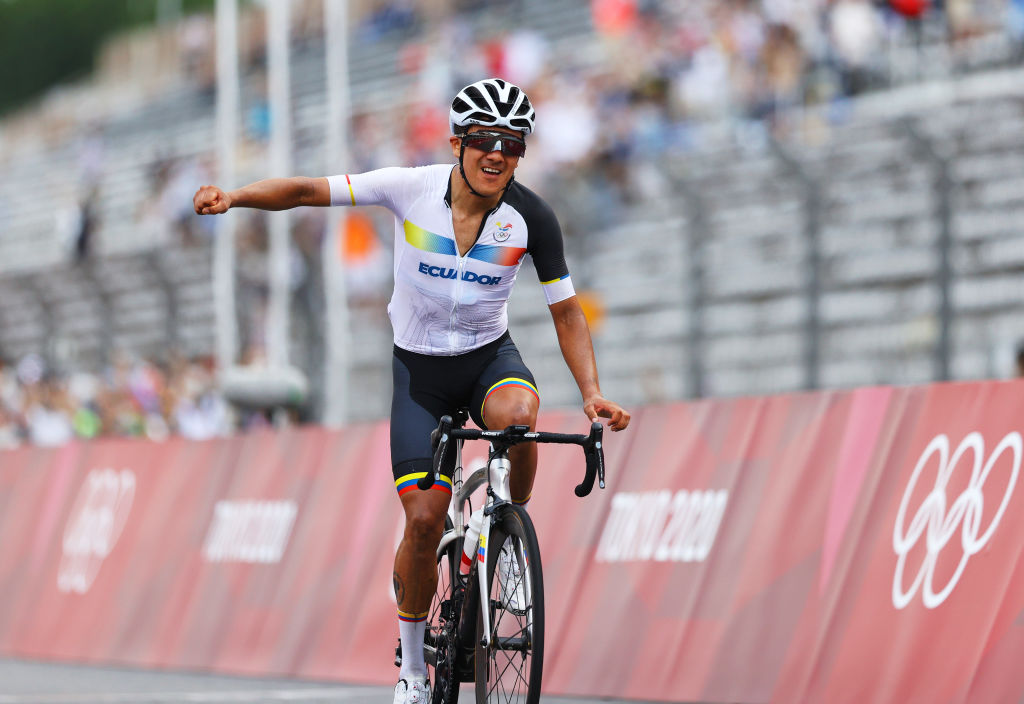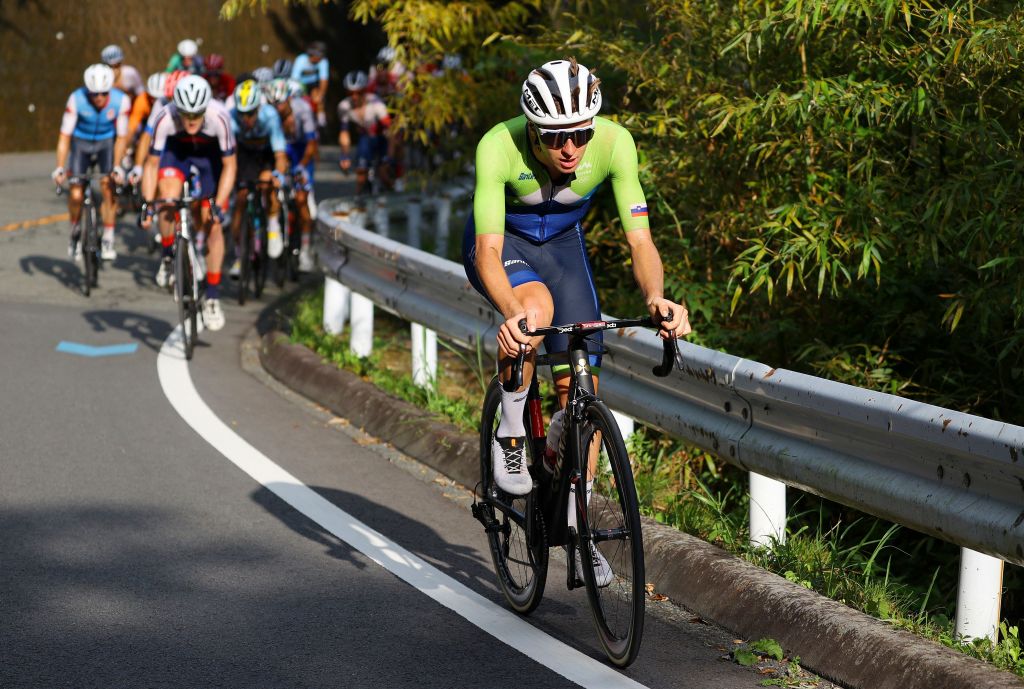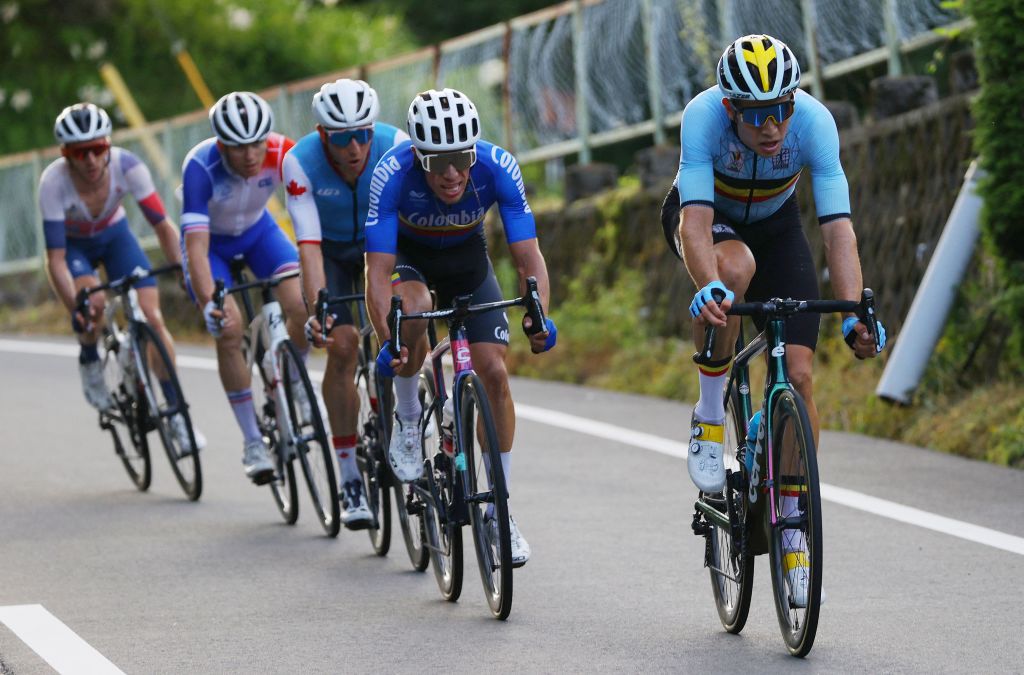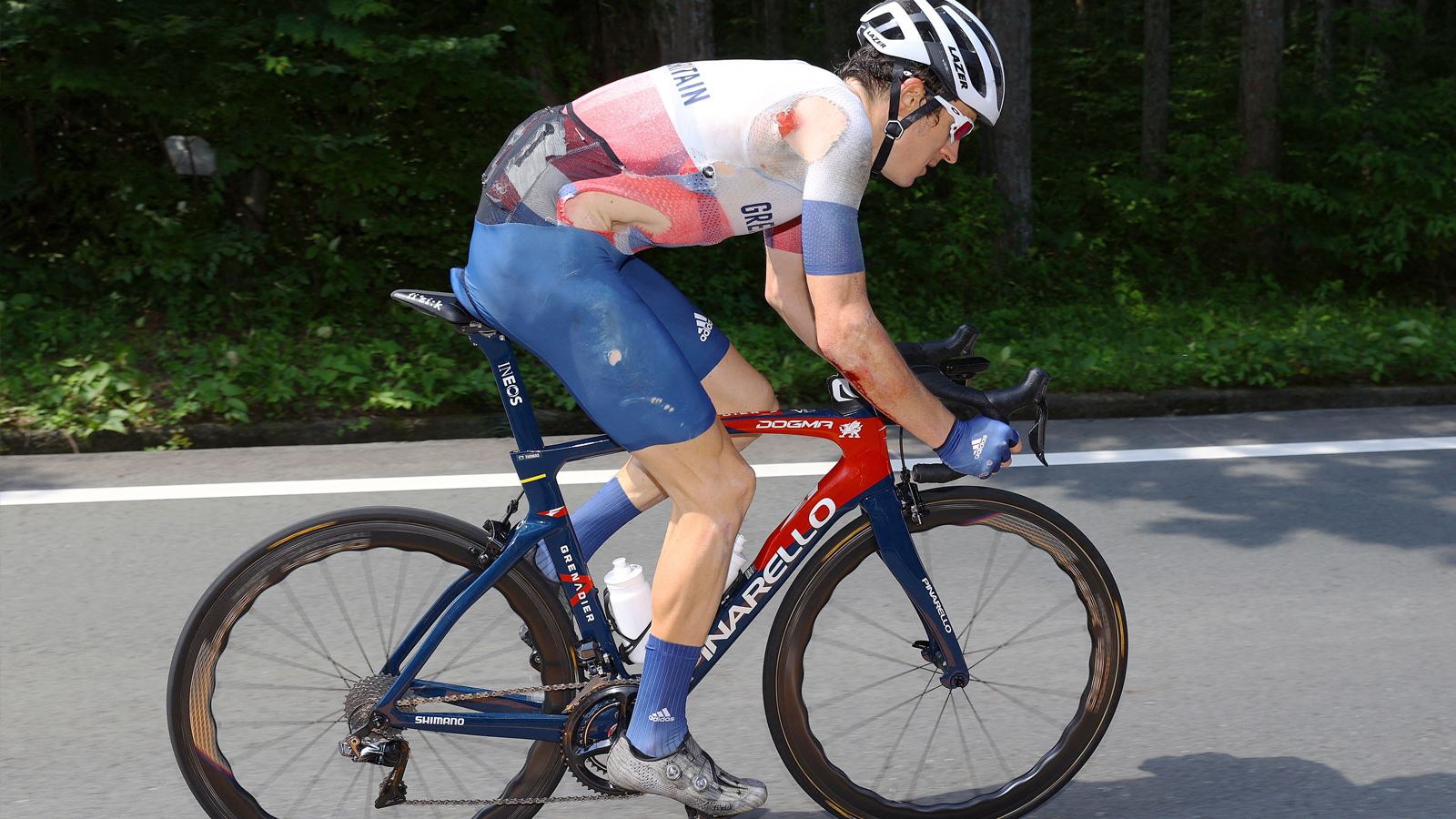6 conclusions from the men's Tokyo Olympics road race
Carapaz's flex, Pogacar's regret, Thomas needs a rest, and more

After 234 tough kilometres of the mountainous course of the Tokyo Olympics road race, it was Ecuador's Richard Carapaz who raised his arms in triumph as his country's second-ever gold medal winner.
Carapaz proved the strongest – and the smartest – on Saturday, but beyond his gold medal-winning ride, there was plenty more to discuss.
The race saw a surprisingly strong ride from USA's Brandon McNulty, with the 23-year-old getting away with Carapaz before being caught late on. Pre-race favourites Tadej Pogačar and Wout van Aert were both unable to make the winning move of the day, though not for the lack of trying.
Elsewhere, Geraint Thomas crashed again and looks due a break from racing while Rio gold medallist Greg Van Avermaet saw his reign draw to a close.
We've gone in-depth on the biggest talking points from the Tokyo road race – read on for our 6 conclusions from the day.
The Carapaz flex
In so many ways, Richard Carapaz is the antithesis of the typical Sky/Ineos prototype. He appears to ride on instinct rather than numbers, while the manner in which he won the 2019 Giro demonstrated just how much of a tactical streetfighter he can be towards the backend of a gruelling race. Those sort of qualities were firmly on show during Saturday's main event when the rider from Ecuador used both brains and brawn to full effect, and capitalized with some ruthless riding to ensure his status as a national hero.
He was dropped when his Tour rival Pogačar blew the race apart on the penultimate climb of the Mikuni Pass but carved his way up the ascent before making contact with the main selection before the summit. For the first time in the race Carapaz, who started the day with just one teammate, was on an equal footing with the rest of his rivals.
Get The Leadout Newsletter
The latest race content, interviews, features, reviews and expert buying guides, direct to your inbox!
The cat and mouse nature of the final 30km was some of the most open racing we've seen all year - Bradley Wiggins rightly likened it to a junior race – but when Brandon McNulty countered after moves from Jakob Fuglsang and several others it was Carapaz who pounced. This was the perfect attack to follow. McNulty, for all his talent, is still relatively inexperienced, while his move with Pogačar and Woods earlier in the race would have undoubtedly cost the American some bullets.
If it had come down to a sprint, Carapaz may have shaded it, but when he sensed weakness in the final five kilometres his ruthless streak cut in once more and the race was effectively won. The sight of the Ineos rider using up Pogačar's trade teammate and then spitting him out the back before sealing the win is probably what the youth of today call 'a flex' but regardless of the terminology it was one of the most accomplished one-day rides of 2021 and it will provide Ecuadorian cycling with a standard bearer and icon for years to come.
Pogačar's 'regret'

Is this what a bad day looks like for Tadej Pogačar? When he can't drop an entire peloton and his rivals finally have an answer for his incredible accelerations? Such has been his dominance at almost every turn that it's become something of a habit to see the Slovenian triumph at everything he turns his hands to.
However, in the blistering heat and humidity of Tokyo he finally began to show signs that he is indeed human, although when he took off with around 34 kilometres to go it briefly looked as though he would add an Olympic title to his palmarès. It wasn't to be, however. His move was nullified, and he became just one of a dozen or so riders fighting for the win once the main selection was made.
Pogačar still played an active role in the finale, attacking and counter attacking several key moves but a third-place finish was his reward in the end. It was a fair result on balance. He made the race – or at least significantly altered its course – and his team were arguably one of the strongest ensembles in the race.
There was talk of regret in his post-race press conference, but like Van Aert there was little to fault the Slovenian for in terms of his tactics. The punch wasn't quite there but his approach to the race was without reproach.
McNulty shines
When the head of USA Cycling, Jim Miller, talked of the US aiming for seven medals in Tokyo his words were mainly directed towards the women's programme, with strong prospects in mountain biking, track and the women's time trial. Lawson Craddock received a notable mention but even Miller wasn't sure how Brandon McNulty would stack up after a demanding Tour debut.
On Saturday, Miller and a watching audience got their answer with a commanding performance full of verve and courage from the young American. He was one of two riders able to crawl up to Pogačar's wheel on the major climb of the day, and he was not daunted by battling his trade team leader, riding aggressively before the bunch were able to react and chase the move down.
McNulty wasn't finished there, with the American creating the winning move with 25 kilometres to go with a fine acceleration at the perfect moment. In Carapaz he had a willing ally who would fully commit and, but for a brief wobble with five kilometres to go, the USA and McNulty would have woken up to a silver medal on Sunday.
The fact that he was able to recover and still take sixth when the chasers caught him illustrated just how close to a medal he was. It bodes well both for his continued development as a complete allrounder, and as a prospect for Wednesday's individual time trial.
Van Aert's versatility isn't enough

There was no Tour de France hangover for the Belgian leader who almost pulled off one of the greatest ever racing displays the Games had ever seen in men's cycling. Despite having one of the best and largest teams in the race, Wout van Aert – like many of his rivals – found himself isolated on the penultimate climb and while the majority of his rivals had one or two attacks in their legs the Belgian turned himself inside out in order to chase down attack after attack.
With so many spinning plates to manage it was only a matter of time before one dropped but he could hardly be criticised for not following McNulty and Carapaz – two of the least fancied riders left in the race. With one climb still to come Van Aert hit the front and brought the two leaders to within just 14 seconds, and had the juncture been made he might have been able to alter the outcome of the race.
The reality, however, was that even if McNulty and Carapaz had been caught there was no way Van Aert would have been allowed to escape and he would have only faced another volley of attacks without any chance of recovery. Given the way in which the race panned out the Belgian couldn't have done much more, but a place on the podium should still be considered a success and not the near miss that some corners have painted it.
Van Avermaet's reign begins and ends in style
He's not the force he once was, and he's certainly closer to the end of his career than the start, but Greg Van Avermaet still has much to offer as an outstanding bike rider. Despite being 36, he remains competitive but there are so many more facets and dimensions to his riding and experience, and he brought all of those qualities into the Tokyo Games as the defending men's champion.
Before the race he spoke publicly about the honour of being the champion, and of how the title changed his life for the better, and rather than resent the position of domestique within Belgian team he embraced the role and made it his own. He imparted his calm exterior on the rest of the team and dutifully worked his socks off in the first few hours of the race as he set the tempo on the front of the peloton.
That role requires a special sort of skillset and there are few champions who would be willing to ride in such a manner without at least holding something back for their own chances, but Van Avermaet put ego aside and threw everything into supporting his squad before eventually abandoning the race in the latter stages. A rider who won with style in Rio five years ago brought down the curtain on his reign with a different yet just as classy performance in Tokyo.
Thomas needs a rest

His body language said it all, and as he picked himself up from the tarmac for at least the third time in the last month Geraint Thomas looked both utterly dejected and empty at the same time. With so many questions over both his short- and long-term future the only certainty at this point is that the Welshman needs a break.
Physically, he appears to be fine. The damage done in the latest crash was more superficial, and a combination of pride and frustration with how his season has developed since late June will carry him through to Wednesday's time trial, where a medal is still possibility. But mentally, for a rider who needs to be 100 per cent dialled in for major objectives, it's clear that time off the bike is needed.
In one sense, that notion comes at the worst possible time. He's out of contract for next year and with no Grand Tour results since 2019 it would be no surprise if Ineos weren't prepared to renew his contract on its existing terms.
Before the Games, the former Tour winner was talking about a short turnaround before racing again in less than a fortnight but with the Vuelta already unlikely and only the Worlds left to aim for, now feels like the right time for a short pause.
In terms of the crashes and their consistency it feels as though Thomas is in a similar place to Christian Vande Velde from about 10 years ago – another rider who just couldn't catch a break and was constantly in the wrong place at the wrong time in the latter stages of his career.
What's clear is that with each passing year and with each fall it gets that little bit harder to pick yourself up off the tarmac, and if Thomas needs to discover the right mindset for 2022 then there's little point in racing him into the ground with a glut of weeklong stage races in the second half of the year.
Daniel Benson was the Editor in Chief at Cyclingnews.com between 2008 and 2022. Based in the UK, he joined the Cyclingnews team in 2008 as the site's first UK-based Managing Editor. In that time, he reported on over a dozen editions of the Tour de France, several World Championships, the Tour Down Under, Spring Classics, and the London 2012 Olympic Games. With the help of the excellent editorial team, he ran the coverage on Cyclingnews and has interviewed leading figures in the sport including UCI Presidents and Tour de France winners.
